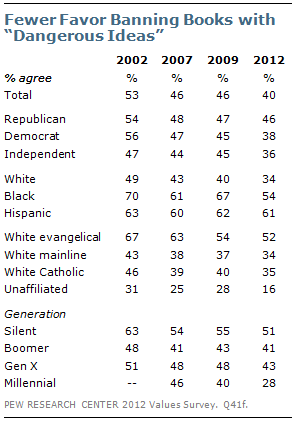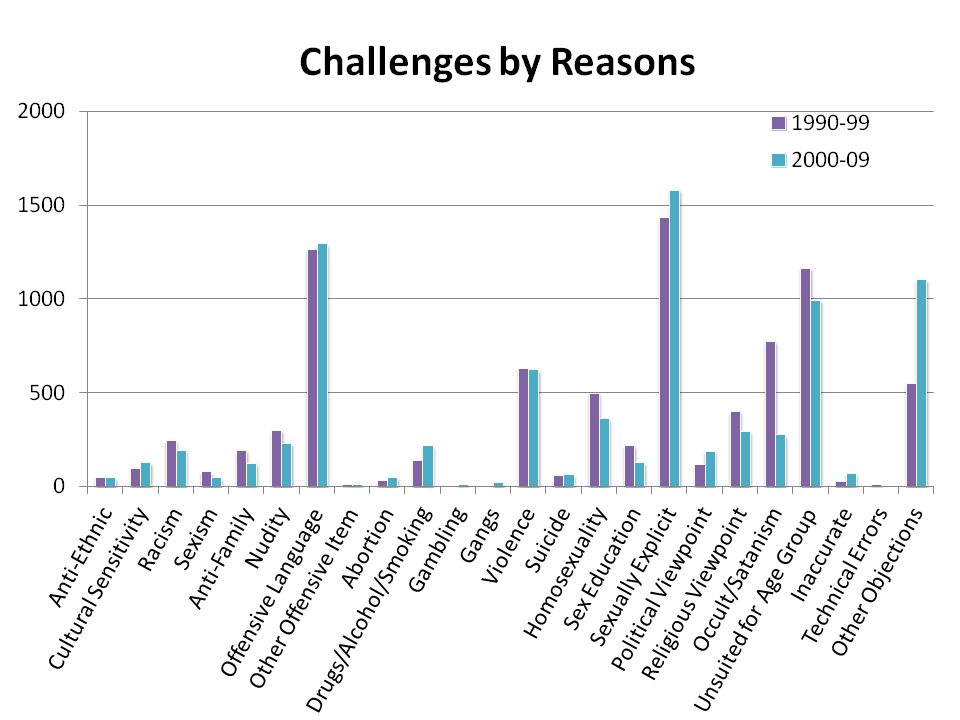The weekly report on research and demographics of the secular movement
by Julie Esris
Lincoln High School of Tallahassee, Florida made the news this week when Principal Allen Burch cancelled the summer reading assignment, Mark HaddonÔÇÖs 2003 novel, The Curious Incident of the Dog in the Nighttime. BurchÔÇÖs decision to cancel the assignment was in response to a number of parents raising complaints about the bookÔÇÖs content, which included scenes of characters taking GodÔÇÖs name in vain and as well as expressing atheistic beliefs. Other complaints included the bookÔÇÖs foul language, which included several instances of the ÔÇ£fÔÇØ-word. The Curious Incident of the Dog in the Nighttime is a critically-acclaimed novel about a fifteen-year-old autistic savant who solves a mystery of the brutal murder of a dog.
Every year, the American Library Association reports book challenges and book bans, some of which, like Curious Incident, are due to readersÔÇÖ religious objections. It is very disheartening to hear the numerous stories of books being challenged and banned in school and public libraries. However, a 2012 Pew study reveals that the percentage of those who favor banning books with ÔÇ£dangerous ideasÔÇØ has dropped. In fact, for the first time ever, a slim majority (55%) of the American population is against the idea of banning books; 40% believe in banning such books. As recently as 2009, the split was more even, with 49% being against book banning and 46% being for it. This decline over the years is consistent along demographic lines. However, a look at these numbers reveals the differences in the attitudes of different groups towards book banning.
Predictably, those who have more conservative political or religious affiliations tend to be more in favor of banning books. 46% of Republicans support banning books with ÔÇ£dangerous ideasÔÇØ, while only 38% of Democrats and 36% of Independents support this practice. Attitudes are also divided along racial lines, with white people the least likely to support book banning (34%), followed by black people (54%) and Hispanic people (61%). Pew studies have consistently shown that Catholics are among those with the most liberal viewpoints out of Christian groups surveyed, and this time is no exception (however, it is important to note that in this particular study the only religious people surveyed were white): Catholics and Mainline Protestants nearly tied with their views on book banning, this time with Mainline Protestants (34%) being slightly more liberal than Catholics (35%). Predictably, the group whose members hold the most conservative viewpoint is Evangelical Protestant (52%). Also predictably, the religiously unaffiliated are less likely (at 16%) than the religious to believe in banning books. Differences are also drawn along generational lines, with the ÔÇ£SilentÔÇØ era the most in favor of book banning (51%), followed by Baby Boomers (41%), Generation X (43%), and Millennials (28%). This is consistent with the pattern of each generation becoming more liberal than its predecessor.┬á
It is very clear from this study that people with more liberal affiliations tend to be the least likely to support banning books for any reasons. The divisions among ethnic groups are also worth considering. Hispanic people (61%) and black people (54%) are the most likely of those surveyed to support banning books. It is possible that their objections stem from the history of racism that they have endured in America. Even today, many books have racial stereotypes that could be offensive to minority groups.
Although this poll has revealed different groupsÔÇÖ reasons for banning books, it does not survey a large enough variety of groups to paint a clearer picture. The Pew Research Center polled Democrats, Republicans, and Independents. However, Independents may comprise people with liberal or conservative persuasions. For example, someone who might be labeled ÔÇ£IndependentÔÇØ could support the Communist Party, or he could support the Libertarian Party. The poll also suffers because the only religious groups it surveyed were Christian groups. It would be interesting to see the percentage of Jews that support book banning. The Jewish culture in particular is noted for its intellectual slant, with almost a quarter of Nobel Prize Winners being Jewish. Additionally, it is strange that the only Christians who were surveyed were white. What about black Christians? Or Asian Christians? Or unaffiliated people who belong to different ethnic groups?
Additionally, the poll does not provide data on reasons for wanting to ban books. It would be helpful to know if the different groups cited different reasons for supporting book bans, specifically which groups support the bans for religious reasons. However, a poll published on Butler UniversityÔÇÖs website reveals that the most common reasons are sexual content and offensive language, with religion trailing far behind (unfortunately, the statistics are not reported in terms of percentages).
The Pew study is a good start in providing insights on reasons for different groups wanting to ban books, but it is not enough. A more comprehensive study would need to be conducted to provide a clearer picture.
